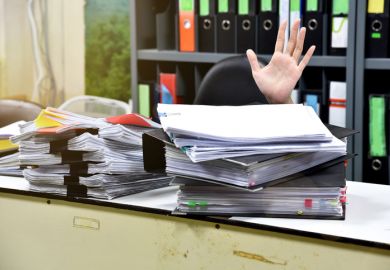Early career scholars’ stories of stolen work and exploitation have sparked a national conversation about the state of research in Denmark.
Initially, the 120 anonymised accounts of stolen first author credits, plagiarism by PhD supervisors and unfair authorship requests collected by Maria Toft, a PhD fellow in the University of Copenhagen’s department of political science, and Denmark’s national PhD association aimed to highlight the raw deal faced by young researchers, but the #pleasedontstealmywork campaign seems to have resonated just as strongly with older academics struggling with the pressure to publish.
“People are afraid to tell their stories because they know there will be consequences – no one else has dared to speak out publicly,” said Ms Toft, whose activism began when she faced pressure to cede first authorship to more senior researchers on a paper she had written.
“To have more than 100 researchers come forward with their stories in such a small country suggests that my situation was not exceptional. This didn’t happen because professors are evil – it is a symptom of a culture of research in which academics are forced to compete against each other and where the number of publications is more important than their quality.
“People are incentivised to steal research and get credit from younger colleagues – in this situation, it is a downward spiral, and everyone loses.”
Her campaign has been embraced by some of the country’s most eminent scholars, who believe that a radical reset of Danish research management is needed. More than 2,000 academics have signed a petition calling for a national commission to “set research free” by reforming what Ole Wæver, chair of the research policy committee at the Danish Academy of Sciences, called “hyper-hierarchical governance and foolish funding structures” that encourage research theft.
“Fortunately, Maria resisted the inclination of the media to make this a story of evil and lazy older academics,” said Professor Wæver, professor of international relations at Copenhagen.
“Instead, she refocused it on structural questions: the increasing pressure on scholars to publish unrealistic numbers of publications with less and less time for research, the weaknesses of the current leadership system when it comes to protecting the most vulnerable staff and where modern leaders tend to care more about brand control and avoiding disturbances.”
The growing support for the grassroots campaign, started in February, to incorporate the Chicago principles of academic freedom into the 2003 Danish University Act has been “quite striking”, continued Professor Wæver.
“There is a strong sense of crisis and that the situation is much worse ‘on the floor’ than realised by politicians and the public,” he said, adding that “we need to inform [people] about this because we can’t trust the established structures to convey this information”.
For Ms Toft, the fallout from opening up about her own experiences has “not been a pleasant ride”, she explained. However, she was glad that the failures of Denmark’s system have now been recognised. “If we can’t acknowledge the wounds in our system, we will never heal,” she said.
Register to continue
Why register?
- Registration is free and only takes a moment
- Once registered, you can read 3 articles a month
- Sign up for our newsletter
Subscribe
Or subscribe for unlimited access to:
- Unlimited access to news, views, insights & reviews
- Digital editions
- Digital access to THE’s university and college rankings analysis
Already registered or a current subscriber?








